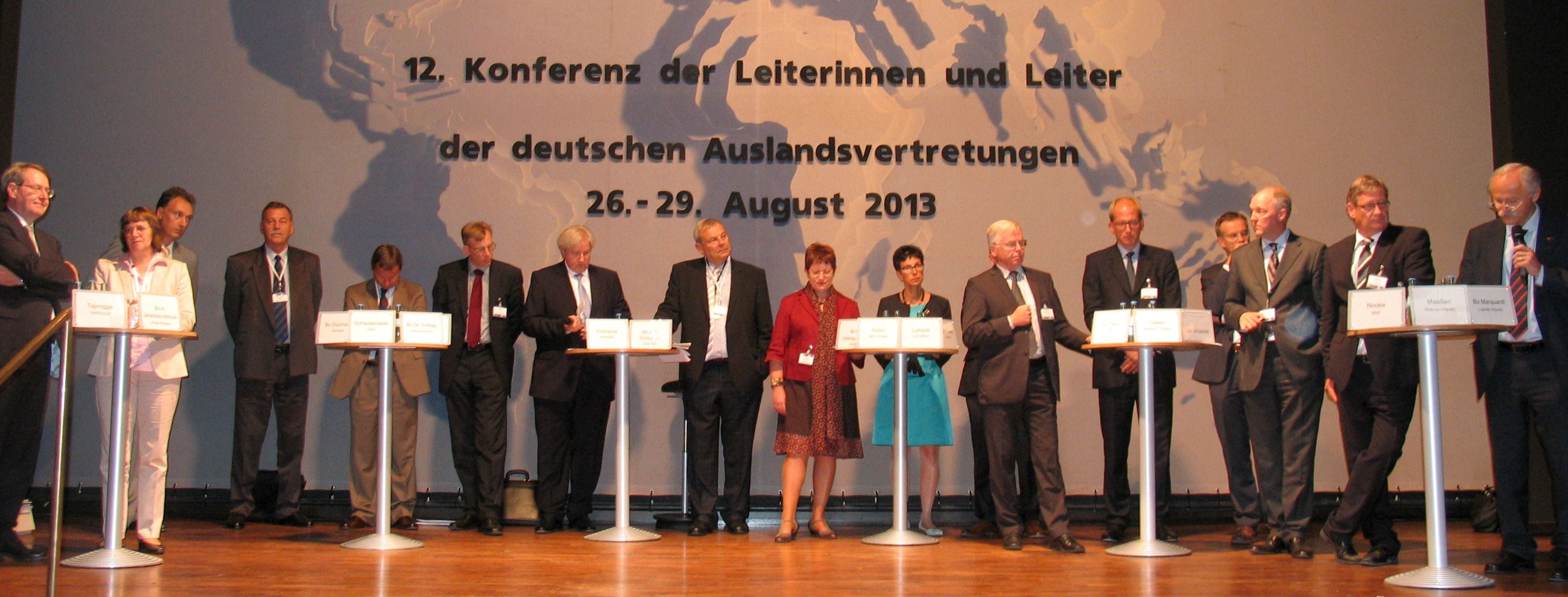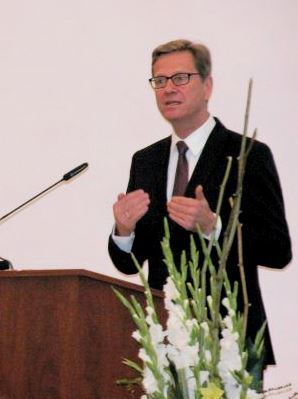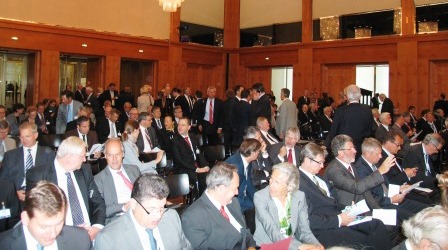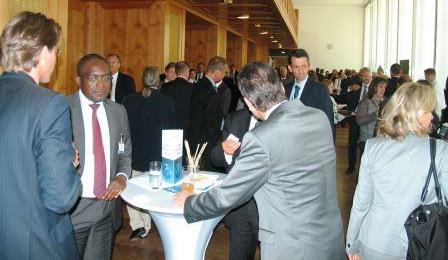Ambassadors urge German economy to increase their commitment in Africa

(chr) Calls on the German economy to become more active in Africa were a central train of thought througout many events att he 10th Business Day of the German Ambassadors' Conference. Foreign Minister Guido Westerwelle also dedicated about half of his half-hour welcoming speech to the African continent – mostly to the Arab Spring in northern Africa, which was "experiencing the first minutes of a historic hour". The minister urged the audience, consisting of some 1500 representatives from industry, administration and politics, to "not avert the eye, but take a closer look!" because Africa is "the continent of opportunities".
 The panel discussion on "Africa – Market of Opportunities", featuring many ambassadors, introduced South Africa, Nigeria, Kenya and Angola as interesting markets. Ambassador Dr. Horst Freitag (Johannisburg) presented South Africa once more as "the gate for opening up the market in Sub-Saharan Africa" as it possesses for the most part good infrastructure and a functioning banking system. Germany's assiduous ambassador in Lagos, Dorothee Janetzke-Wenzel, pleaded passionately for Nigeria, which saw an average of 7-10% economic growth in recent years. German entrepreneurs who operate successfully in this market with its 190 million consumers, told her: "We cannot afford not to be here!" She encouraged the industry representatives in the audience to be more adventurous: "Sometimes you just have to jump! The water is warm in Africa!" Germany's ambassador in Kenya, Margit Hellwig-Bötte, urgently advised expansive companies to establish a branch in Africa.
The panel discussion on "Africa – Market of Opportunities", featuring many ambassadors, introduced South Africa, Nigeria, Kenya and Angola as interesting markets. Ambassador Dr. Horst Freitag (Johannisburg) presented South Africa once more as "the gate for opening up the market in Sub-Saharan Africa" as it possesses for the most part good infrastructure and a functioning banking system. Germany's assiduous ambassador in Lagos, Dorothee Janetzke-Wenzel, pleaded passionately for Nigeria, which saw an average of 7-10% economic growth in recent years. German entrepreneurs who operate successfully in this market with its 190 million consumers, told her: "We cannot afford not to be here!" She encouraged the industry representatives in the audience to be more adventurous: "Sometimes you just have to jump! The water is warm in Africa!" Germany's ambassador in Kenya, Margit Hellwig-Bötte, urgently advised expansive companies to establish a branch in Africa.
What is the most expensive city in the world? Luanda, Jörg Marquardt, German ambassador in Angola, told the surprised audience. According to him Angola, which produces two million barrels of oil per day, is extremely interesting for German companies because the people there are very fond of Germans. Nevertheless, legal advice is definitely needed to cope with the heavy red tape. In Angola it takes twelve permits and licences to set up a company, said the ambassador.
 German companies are facing major problems when they come in contact with requests for corruption or bribes, often indirectly through their trading partners in African countries. "You can easily get into compliance problems", was a comment from the audience. A lady from the banking sector said that no German company was still stupid enough to have slush funds, but nobody could vouch for their African partners.
German companies are facing major problems when they come in contact with requests for corruption or bribes, often indirectly through their trading partners in African countries. "You can easily get into compliance problems", was a comment from the audience. A lady from the banking sector said that no German company was still stupid enough to have slush funds, but nobody could vouch for their African partners.
The lack of legal certainty and the problem of financing are further issues that make German entrepreneurs shy away from activities in Africa. Several people in the audience would like to have guidelines for doing business in Africa, including a list of competent legal advisors. Mr Wendt from the German entrepreneurial development cooperation Deutsche Investitions- und Entwicklungsgesellschaft (DEG) admitted that the network of German Chambers of Commerce (DAHK) in Africa was "extremely thin". Heiko Schwiderowski, head of the Africa section of DAHK, argued that new representative offices would soon be opened in Mozambique and Tanzania. Further offices in Sub-Saharan Africa should follow. "You cannot put a mouse in a cat's mouth", said Germany's ambassador in Guinea, Bernhard Kampmann, during the panel discussion on "Business in Crisis Regions". He made it clear that ambassadors could not force the economy to do business even outside countries such as Senegal or Ivory Coast. He found it striking that entrepreneurs seemed to be more afraid of "the absence of state than of too much state".
 Dr. Stefan Liebing, chairman of Afrikaverein der Deutschen Wirtschaft (German-African Industry Association), drew a positive conclusion from the event. He was sure that the next round of emerging markets would be in Africa. Overall conditions had improved so much that German companies could not afford to stay away. He estimated the potential for plant engineering following the exploitation of natural resources at 87 million euros. "The German economy must not miss the further development on the Black Continent", he said.
Dr. Stefan Liebing, chairman of Afrikaverein der Deutschen Wirtschaft (German-African Industry Association), drew a positive conclusion from the event. He was sure that the next round of emerging markets would be in Africa. Overall conditions had improved so much that German companies could not afford to stay away. He estimated the potential for plant engineering following the exploitation of natural resources at 87 million euros. "The German economy must not miss the further development on the Black Continent", he said.